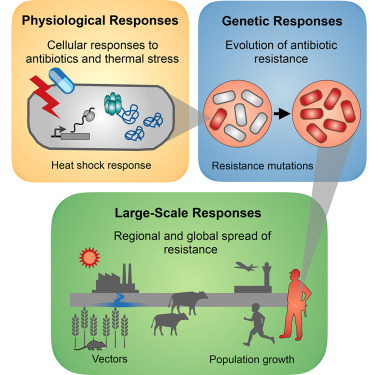iScience ( IF 4.6 ) Pub Date : 2020-03-30 , DOI: 10.1016/j.isci.2020.101024 Alejandra Rodríguez-Verdugo 1 , Natalie Lozano-Huntelman 2 , Mauricio Cruz-Loya 3 , Van Savage 4 , Pamela Yeh 5

|
Bacteria have evolved diverse mechanisms to survive environments with antibiotics. Temperature is both a key factor that affects the survival of bacteria in the presence of antibiotics and an environmental trait that is drastically increasing due to climate change. Therefore, it is timely and important to understand links between temperature changes and selection of antibiotic resistance. This review examines these links by synthesizing results from laboratories, hospitals, and environmental studies. First, we describe the transient physiological responses to temperature that alter cellular behavior and lead to antibiotic tolerance and persistence. Second, we focus on the link between thermal stress and the evolution and maintenance of antibiotic resistance mutations. Finally, we explore how local and global changes in temperature are associated with increases in antibiotic resistance and its spread. We suggest that a multidisciplinary, multiscale approach is critical to fully understand how temperature changes are contributing to the antibiotic crisis.
中文翻译:

气候变暖和抗生素耐药性的复合效应。
细菌已经进化出多种机制来在含有抗生素的环境中生存。温度既是在抗生素存在下影响细菌生存的关键因素,也是因气候变化而急剧增加的环境特征。因此,了解温度变化与抗生素耐药性选择之间的联系是及时且重要的。本综述通过综合实验室、医院和环境研究的结果来检验这些联系。首先,我们描述了对温度的短暂生理反应,这种反应改变了细胞行为并导致抗生素耐受性和持久性。其次,我们关注热应激与抗生素耐药性突变的进化和维持之间的联系。最后,我们探讨局部和全球温度变化如何与抗生素耐药性的增加及其传播相关。我们建议,多学科、多尺度的方法对于充分了解温度变化如何导致抗生素危机至关重要。











































 京公网安备 11010802027423号
京公网安备 11010802027423号